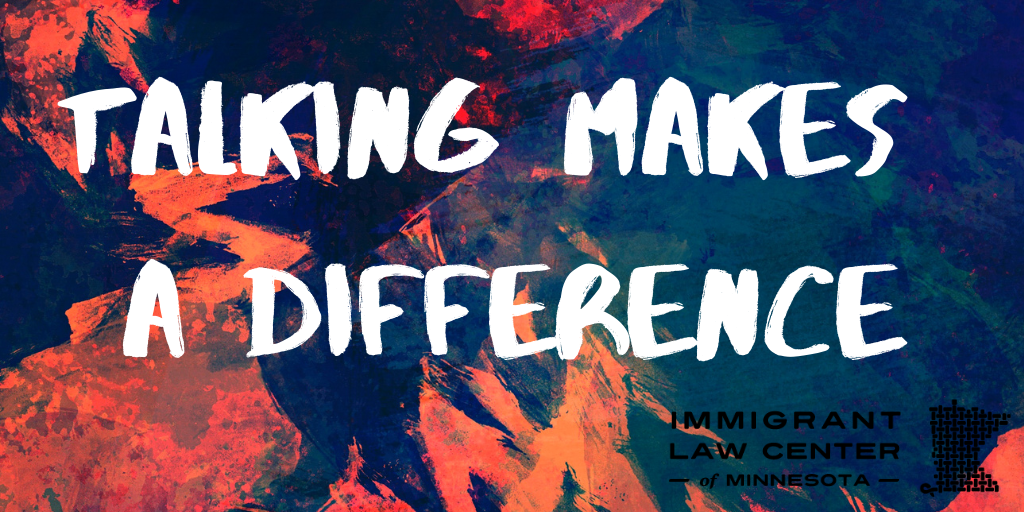News > ILCM In The News
Tips for Talking About Immigration
Posted on Nov 26 2019
In this political season, we face the opportunity and challenge of conversations with family and friends about immigration. (And race. And LGBTQ rights. And all the rest of the political issues that divide us.)
Why Talk?
Should we even go there? Is there any good in talking when we have profound disagreements?
Each person needs to decide what they can handle. No one should be told, ‘You need to do this to save your community.’ We need to respect individual decisions about personal safety and survival.
On the other hand, difficult conversations can have real value. In Real Talk: You Need to Talk to Your Family (Whoever They Are) About Politics at Thanksgiving, Elizabeth Logan wrote:
“This isn’t like a bad boyfriend where we can just stop answering their calls. America can’t break up with itself. We’re in this relationship forever, so even though it hurts, even though it takes forever, even though it’s annoying, I am begging you, before you pass the mashed potatoes: baby, let’s just talk about it.”
Talking Makes a Difference.
Minnesota’s Marriage Equality campaign succeeded in large part because of conversations. Beginning decades before the 2012 vote, OutFront Minnesota trained organizers to engage people with conversations and stories. The conversations worked—not all the time, but enough times to gain majority support for marriage equality.
How to Talk About Immigration
Dozens of websites and articles offer good and bad advice about how to talk to family about immigration and other political issues.
- Really listen. This is a conversation, not a lesson or sermon. Care about the person you are talking to.
-
- Ask thoughtful questions, inspired by whatever honest curiosity you feel.
- Try to understand, not convince or persuade.
- Share personal stories and experiences, not data points.
- Notice if there are areas of agreement, especially share values. Focus on positives rather than arguing about negatives.
- Assume good intentions and extend the benefit of the doubt.
- Thoughtfully end the conversation when you are triggered or tired.
- Share appreciation for having the conversation.
Some people are not ready for conversation. (Sometimes the person who is not ready is you—especially if you are feeling particularly stressed, hurting, or angry.) Sometimes your best option is just to change the topic, take a break, or go for a walk.
But what about the lies?
As satisfying as it feels to pile up fact after fact and denounce the lies spread about immigrants and immigration, that usually is not the most effective strategy.
“Debunking false information, or contrasting myths with facts, intuitively feels like it should effectively correct myths. But research shows that such correction strategies may actually backfire, by making misinformation seem more familiar and spreading it to new audiences. …
“Repeating a myth may also lead people to overestimate how widely it is accepted in the broader community. The more often we hear a myth, the more we will think it is widely believed.”
Focusing on the positive—personal stories and good information about immigrants—is more effective.
Want to read more?
Here are links to some websites offering advice on talking to family and friends about immigration and other political issues.
- Real Talk: You Need to Talk to Your Family (Whoever They Are) About Politics at Thanksgiving – great article from Glamour magazine. Though published in 2016, its advice and explanations remain solid.
- Top Ten Conversation Tips from Listen First Project – easy reference list
- ‘Always truth in their story’: How one author talks across political divides – Mónica Gúzman shares lessons she learned about talking to her own opposite-political-view parents
- Talking Sense — A 2024 MPR project with multiple stories and interviews that tries to “teach Minnesotans how to think through these challenging political conversations in advance…”





